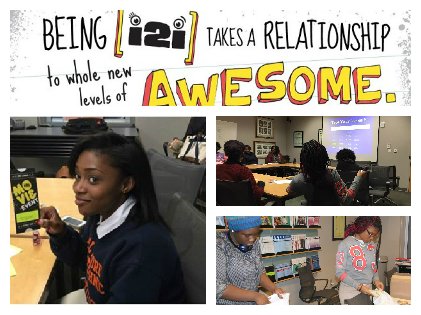On a brisk night in February there is a lot of noise coming from a fourth floor conference room at the Johns Hopkins Center for Adolescent Health in East Baltimore. The raucous sound rises and falls blending in with a recording of the Jeopardy theme song as eight Baltimore City teenagers play “Teen Years Jeopardy,” a game designed by instructors to test their knowledge of healthy relationships.
RELATED STORY: Nominate a changemaker working to reduce violence in Baltimore
A $400 question, “What type of behavior could be considered abusive?” has ignited an intense debate among the seven girls and one boy in the group.
Some students say answer C, “Your partner takes a nap while you’re talking about something important,” is emotionally abusive. Experts say this is not considered abuse, but the teens disagree, which leads to a discussion about healthy communication.
Hopkins assistant Professor Teri Williams Powell uses the exercise as a learning opportunity. “It is absolutely disrespectful. Is it abusive? I don’t think so.” She said. “Not all situations of dating violence are as clear cut as we would like them to be. Keep this in mind as we’re talking to young people that we should really listen to what people are saying.”
The teens are training to become Youth Brand Ambassadors for the Dating Matters Program, a Centers for Disease Control and Prevention teen dating violence prevention initiative. The pilot program began in 2012 in Baltimore; Chicago; Fort Lauderdale, Florida; and Oakland, California— all cities with similar urban violence problems. Baltimore Dating Matters is part of the Baltimore City Health Department’s Office of Youth Violence Prevention and supports the Healthy Baltimore 2015 priority area of Healthy Children and Adolescents.
The project serves twelve middle schools in the city neighborhoods of Upton; Westport; Curtis Bay; Franklin Square; Milton Montford; Cherry Hill; Sandtown-Winchester; and Middle East. The program focuses on giving sixth to eighth graders the skills to stop dating violence before it begins through a multi-pronged curriculum including teachers, parents and peers.
Preliminary numbers gathered by the health department indicate that 70 percent of Baltimore’s middle school students who said they were in a relationship also said they had been victims of dating violence. Baltimore City Health Commissioner Dr. Leana Wen says despite the shockingly high numbers, dating violence is a preventable public health issue that begins with education.
“We know that young people who experience teen dating violence have a higher instance of psychological issues later; they’re at higher risk for suicide and also at higher risk for risky sexual behavior and drug and alcohol abuse. So, stopping this issue before it starts and really educating teens about the problem is something we believe is a public health need. Outreach is important,” said Dr. Wen.
The teens gathered in the conference room at the Hopkins Center for Adolescent Health are part of that outreach. As the communications arm for the Dating Matters Program called i2i, they undergo training before they visit middle schools to spread the word about healthy relationships and warning signs of dating violence. They organize activities including pep rallies, movie nights and whatever it takes to get through to the 11-14 year-olds they are trying to reach. Social media is also a big part of their strategy with daily posts to Twitter and Facebook about relationships.
Aisha Burgess, Interim Director for the Baltimore’s Dating Matters program, says the curriculum is designed to encourage all kinds of healthy relationships, not just dating. According to Burgess, one of the best parts of the program is that it gives young people a vocabulary to address their feelings.
“When young people are able to identify what they’re feeling, then they’re better able to express and communicate it to others without resorting to violence or aggression,” Burgess said. “We’re teaching them healthy communication should look a certain way and once they start dating they’ll know what to expect from their dating partners as well.”
At the Center for Adolescent Health, Teen Years Jeopardy continues with group leader Katrina Brooks. Brooks, who is the community-relations director for the center, tells the future ambassadors how to explain consent to a middle school student.
“We tell them that consent doesn’t happen once. It’s continuous and it’s clear. One of the examples that we give is, ‘say you let a boy hold your hand. Does that now give him permission to put his arms around you?'” The students reply with a resounding, “no!”
“Or touch your behind?” she continued. “Or kiss you?”—both questions get a unanimous no!
“We use things like that to help middle schoolers understand that just because you give consent for one thing doesn’t mean he has access to you or your personal belongings or your personal space without boundaries,” Brooks said. “A lot of kids say, ‘Oh Miss Trina, I gotta ask every little thing?’ The answer is “yes” you have to ask every little thing.”
Eleventh grader Zhateael Lawrence has been visiting middle schools as a Youth Brand Ambassador for two years and says it’s making a difference in younger students’ lives.
“When we talk to middle school kids about how to prevent themselves from being in unhealthy and unsafe relationships and we tell them the signs to look for, sometimes I do think we get through to them,” said Lawrence. “Nowadays you see teens on the street doing bad things. You see little girls messing with boys and things like that. I didn’t want to be like that. I want to be different and get off the streets and do something good with my life.”
For more information about the Dating Matters Program visit: http://health.baltimorecity.gov/DatingMatters.
